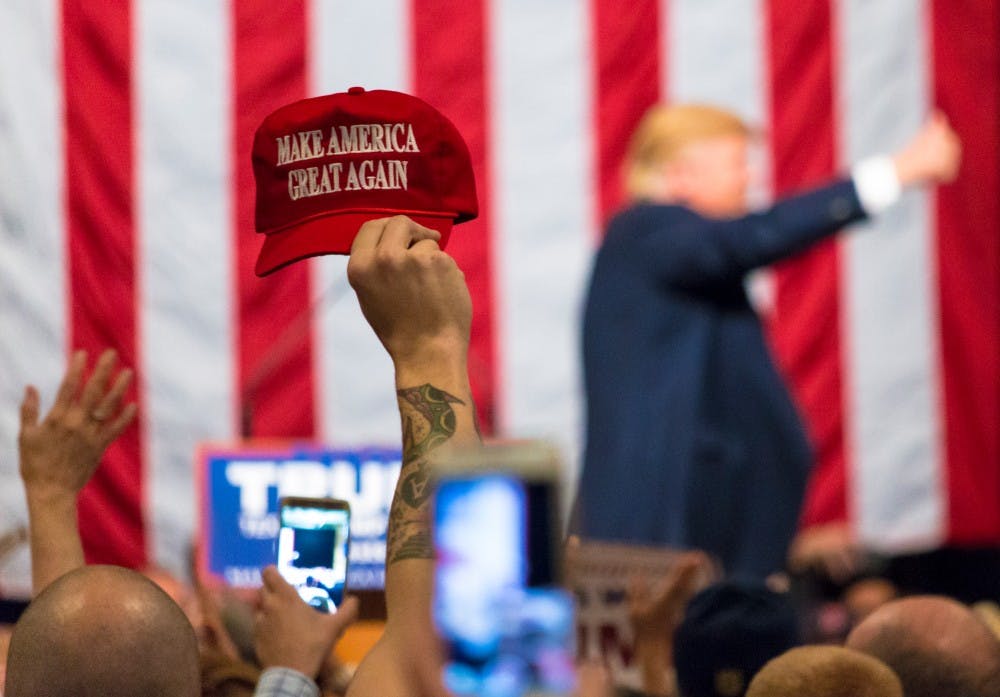
Former classmates of Republican presidential nominee and 1968 Wharton graduate Donald Trump have mostly watched the rise of Trump's candidacy with dread.
Credit: Julio SosaAs 1968 Wharton graduate Donald Trump rose to the top of the field of Republican presidential candidates, his Penn classmates said they watched with dread.
“Like most Americans, and perhaps even most Republicans, I wouldn’t feel comfortable being in the same neighborhood as this guy,” said Donald Morrison, a 1968 College graduate and the editor-in-chief of The Daily Pennsylvanian that year. “When I think that we probably sat in the same classrooms together and — after we both moved to Manhattan — attended some of the same social events, I feel the need to take a shower.”
Morrison now lives in Paris and said fellow expatriates and foreigners alike are stunned by Trump’s rise.
“They can’t believe we’d let an emotionally flawed, proudly ill-informed, proto-fascist sociopath like him anywhere near a teen beauty contestant, let alone a nuclear weapon,” he said.
Members of the Penn community have repeatedly expressed unease with the close association Trump publicly makes between himself and Wharton, often using his degree as a boost to his intellectual credibility.
In Aug. 2015, two months after Trump started his candidacy, over a dozen of his Wharton classmates told the DP that they largely did not remember Trump during his time at Penn.
This past July, over 4,000 Wharton alumni, faculty and current students signed an open letter to Donald Trump stating “You do not represent us,” in which they collectively denounced Trump and the hatred he “actively endorses.” Though the letter states that they chose not to endorse any other candidate, it explicitly condemned his use of the Wharton degree to enhance his credibility.
In October, a separate petition started by 1991 College graduate Nathaniel Popkin urged Penn President Amy Gutmann to publicly denounce Trump and formally distance the University from him.
Jane Rich, another 1968 College graduate, said she did not even realize he was in her graduating class at Penn until seeing him in an interview.
“I found it amusing many, many years ago when I saw him interviewed,” she said. “I heard him telling people that he was first in his class in Wharton.”
She said that she and her husband believe him to be “shockingly horrible and laughable,” adding that she “has nothing good to say about the man.”
“I personally find it hard to believe anybody with an education could believe anything he says,” she said.
To many of his own classmates, the prospect of Trump as president is horrifying.
Dennis Wilen, a 1971 College graduate who entered Penn with the Class of 1968 and was managing editor of the DP that year, referred to that time at Penn as the period of time when college students began to smoke pot, demonstrated against the war and worked for voting rights. The only thing he believes Trump picked up from this generation is “a cool way to get a draft deferment.”
“Every time he says something outrageous, you think ‘oh my god it’s all over it cannot get any worse,’ and then he says something worse,” Wilen said, calling these “drop-dead moments.” “How could anybody be saying the things he says, and also have a Penn degree?”
But while 1968 Wharton graduate Ted Sachs said he is not happy with this election, he said he will “absolutely” vote for Trump.
“The frustrations that have built up within our system are coming to the surface. It’s not very pretty, and it’s not very clean, but I think it is a real frustration,” he said.
Sachs pointed to an article written by Yale professor David Gelernter, which describes the “emasculated” voters who are not thrilled with Trump, but are adamantly opposed to Hillary Clinton.
“I think this concept of voter emasculation and the use of what is polite conversation to put down an opposing argument is not good for the overall society,” Sachs said.
In reference to Trump’s explosive comments, Sachs believes that “a lot of the volatile discussion and a lot of the excitement that he’s stirring up is a way to get people’s attention.” He added that “people that don’t think like I do, think that it is crude, that it is authoritarian, that it is fascist,” but Sachs chooses not to take Trump literally on his words.
“I am sure people will think I am nuts, but I don’t care. I am not hateful, I am not vengeful,” he said, adding that “I think we have to be a lot smarter and a lot more together.”
The Daily Pennsylvanian is an independent, student-run newspaper. Please consider making a donation to support the coverage that shapes the University. Your generosity ensures a future of strong journalism at Penn.
Donate




